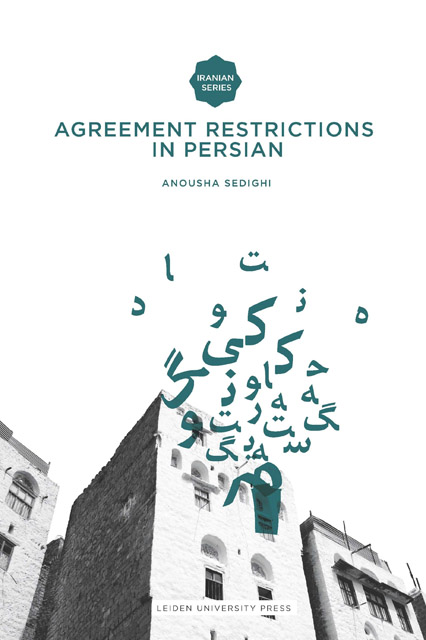Book contents
- Frontmatter
- Acknowledgements
- Table of Contents
- Chapter 1 Introduction
- Chapter 2 Animacy and Agreement Restriction in Persian
- Chapter 3 Psychological Verbs and Multiple Subject Constructions
- Chapter 4 Psychological Verbs in Persian and Applied Arguments
- Chapter 5 Concluding Remarks
- References
- List of Abbreviations
- Backlist Iranian Studies Series
Chapter 5 - Concluding Remarks
Published online by Cambridge University Press: 19 November 2022
- Frontmatter
- Acknowledgements
- Table of Contents
- Chapter 1 Introduction
- Chapter 2 Animacy and Agreement Restriction in Persian
- Chapter 3 Psychological Verbs and Multiple Subject Constructions
- Chapter 4 Psychological Verbs in Persian and Applied Arguments
- Chapter 5 Concluding Remarks
- References
- List of Abbreviations
- Backlist Iranian Studies Series
Summary
The Persian constructions discussed in this work, namely, the constructions with plural inanimate subjects and psychological constructions, both provide evidence for the claim that subjecthood should no longer be viewed as a rigid concept; moreover, subject properties including case, agreement, EPP, and thematic prominence may be split among several constituents in the clause (Harley 1995, Landau 2003, Sigurðsson 2002, among others).
Based on the Persian constructions studied in this work that involved inanimate subjects and experiencers, I propose that the degree of volition or control of the verbal action by the subject is a crucial criterion for verbal agreement in Persian. The feature primitive of theta selection proposed by Reinhart (2001) categorizes agents as [+causer, +mental state]. I argue that as long as any of the two primitive agentive features are missing in the structure of the argument in the subject position, the verbal agreement is somehow constrained in Persian. Inanimate subjects lack the ‘mental state’ feature and can be considered as instruments. Experiencers obligatorily contain a mental state feature, but lack the ‘causer’ feature. In Chapter 2, it was argued that intuitively Persian grammar does not consider inanimate subjects as agents in the sense of having control over their actions (Saadat 1996). In that sense, inanimate subjects are more akin to instruments, a causer with a [-mental state] feature. In addition, a Persian psychological constructions introduced in Chapter 4 lacked the ‘causer’ feature as they expressed a sense of an involuntary state where the psychological state was occurring to the experiencer without the experiencer's control/volition. The implication of the thematic mapping into syntax described above is that subjecthood may not be a sufficient condition for verbal agreement in Persian. Rather, agent-hood may be responsible for agreement. Sridhar (1976) (as discussed in section 3.2) first introduced a similar idea with respect to volitionality and agreement for the dative subject constructions.
Another implication of this work is the tense requirement proposed for the psychological predicates (class III) and their restriction on non-finiteness and nominalization. It was suggested that perhaps this tense requirement for the psychological constructions is universal and has to be explored cross-linguistically.
- Type
- Chapter
- Information
- Agreement Restrictions in Persian , pp. 121 - 122Publisher: Amsterdam University PressPrint publication year: 2010

